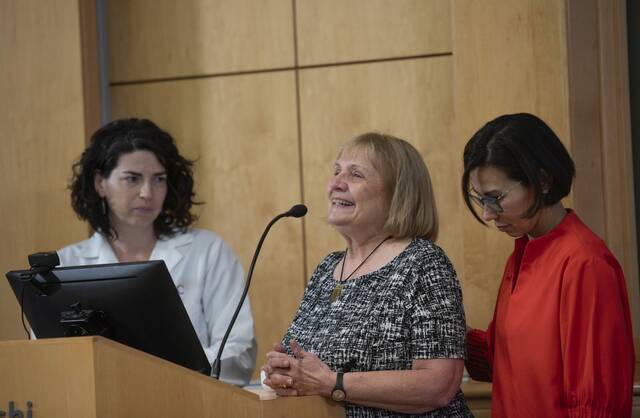https://development.triblive.com/news/health-now/first-recipient-of-upmc-breast-cancer-vaccine-is-hopeful-it-will-help-others/
1st recipient of UPMC breast cancer vaccine is hopeful it will help others

As a young girl, Maria Kitay visited the hospital when her cousin, Clara Carbone Caputo, had breast cancer.
“She put her back up against the wall, and she said, ‘It’s so painful to have this,’ ” Kitay said, tearing up at the memory.
Her cousin later died of her illness, and in February when Kitay herself was diagnosed with Stage 0 breast cancer, she found Caputo’s courage to be an inspiration.
Kitay, who lives in the North Hills, followed that courage to become the first recipient of an experimental breast cancer vaccine developed by researchers from UPMC and the University of Pittsburgh.
Through an upcoming clinical trial, about 50 women like Kitay will receive the vaccine, which is the first of its kind to be used for the cancer known as ductal carcinoma in situ, or DCIS, an early stage of breast cancer in which the cells within the tumor have not spread.
The vaccine was developed after decades of research by University of Pittsburgh and UPMC Hillman Cancer Center immunologist Dr. Olivera Finn. At a presentation Thursday at UPMC Magee-Womens Hospital, speaking from a video message, Finn was optimistic about what the study could mean for the future.
“We look forward to many more women signing up for this trial. This is a very innovative way to approach a breast cancer diagnosis, especially a pre-cancer diagnosis, where we can prevent it with a vaccine eventually, intercept its development into cancer,” she said. “A long-term goal is to prevent cancer, and women who are participating in this trial are really going to help us do that once and for all.”
Vaccines have been tested in people diagnosed with late-stage breast cancer, but once an invasive breast cancer is present, the body’s immune system is already compromised, said Dr. Emilia Diego, a breast surgical oncologist at UPMC Magee-Womens Hospital who is part of the team working on the vaccine.
“Our approach with this vaccine is to teach the immune system to identify the pre-cancer cells and attack them before they can turn into invasive cancer,” she said. “If we can do that, we’ve made significant improvements in the lives of our patients, and hopefully, in how we’re able to treat breast cancer in the future.”
Pioneering vaccine
Kitay received the third of three doses of the vaccine Thursday morning at UPMC Magee-Womens Hospital. On July 3, she will undergo the standard of care of surgery to remove her tumor.
She says she has seen some side effects over the course of her treatment — some soreness in her back and some flareups in her right knee, where she had once had a torn meniscus.
Medical oncologist Dr. Julia Foldi manages the standard-of-care medication that all patients on the trial will receive along with the vaccine. Current treatments for breast cancer have a lot of side effects, Foldi said, and the soreness Kitay described is likely because of that standard-of-care medication. Joint and muscle aches are common side effects of existing cancer treatments.
“Even sometimes people think, ‘well, maybe I just have to take pills for my cancer.’ But even our oral therapies can have significant side effects,” she said. “We use these pills for at least five years. That is a long time to be on a medication that has significant side effects. I think what I am most excited about is the prospect that maybe in the future, I will be giving less of those pills to patients that cause so many side effects, and they can live their lives in better quality.”
A second patient is in screening, Foldi said. Patients participating must be older than 50 or at least post-menopausal, and be diagnosed with DCIS.
If the study is able to prove with the first 50 patients that the vaccine is promising, Diego said, then the team ultimately will look to do a larger trial with more patients.
The team measures patients’ blood to see if there is an immune response during the trial, and plans to follow the patients for years down the line to determine whether their cancer returns.
“It won’t be an answer we can get overnight, but it is hopefully an answer that we’ll get over the next several years,” Diego said. “The purpose of this first trial, or what you would call the phase 1 trial, is in order to determine that there is safety and efficacy in the vaccination, and that it actually does stimulate an immune response.”
Kitay said she wasn’t nervous to get her last dose of the vaccine. She feels honored to have the chance to participate.
“Where I go for my vaccination, I meet a lot of people that are having chemotherapy, and they’ll say, ‘I hope that this vaccination will prevent my daughters from having breast cancer,’” Kitay said. “And I do it for them, too.”
UPMC and University of Pittsburgh researchers announced in August they would be testing the vaccine. The $100,000 seed money needed to launch the clinical trial came from the Pittsburgh-area nonprofit Glimmer of Hope, which was founded with the goal of funding programs, treatments and research targeting breast cancer. The study also is being supported by $2.1 million from the the Breast Cancer Research Foundation.
Patients looking for more information on the trial can call UPMC Surgical Oncology at 412-641-3488 or online here.
Copyright ©2026— Trib Total Media, LLC (TribLIVE.com)
